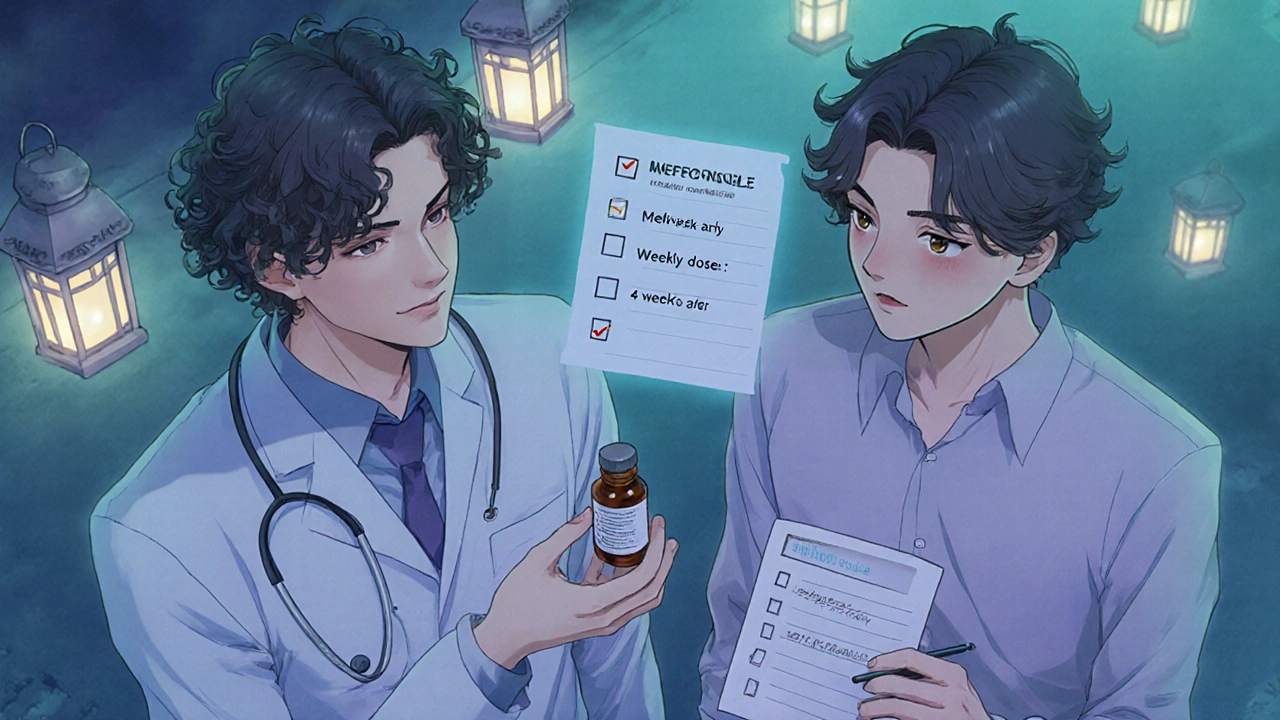Travelling to a malaria‑risk country triggers a flood of advice, and Mefloquine myths are often the loudest. People hear scary stories, see sensational headlines, and end up skipping a drug that could protect them from a life‑threatening infection. This article cuts through the hype, showing you what the science really says.
What is Mefloquine?
When it comes to malaria prevention, Mefloquine is a synthetic quinoline‑derived antimalarial used for both prophylaxis and treatment of infections caused by Plasmodium falciparum. First approved in the early 1980s, it remains a key option for travelers heading to regions where the parasite has developed resistance to older drugs like chloroquine.
The drug works by interfering with the parasite’s ability to digest hemoglobin, which ultimately kills it. Because it stays in the bloodstream for weeks after a dose, a single weekly tablet can keep you covered throughout a trip.
Myth #1: Mefloquine causes permanent brain damage
Stories about “brain‑zapping” side effects spread quickly on forums, but the evidence tells a different story. The World Health Organization (WHO) evaluated thousands of reports and concluded that serious neuropsychiatric events are rare-about 1 in 10,000 users. Most symptoms-like vivid dreams or mild anxiety-are short‑lived and resolve after stopping the drug.
Large cohort studies that followed travelers for up to five years found no higher incidence of chronic neurological disorders compared with the general population. The key is proper screening: people with a personal or family history of psychiatric illness are usually advised to choose an alternative.
Myth #2: Everyone should avoid Mefloquine
Because the drug isn’t perfect, some health agencies suggest “caution.” However, the U.S. Food and Drug Administration (FDA) still lists Mefloquine as a first‑line prophylactic for many destinations. The recommendation is nuanced, not a blanket ban.
When your travel itinerary includes areas with high chloroquine resistance-like sub‑Saharan Africa, the Middle East, or parts of Southeast Asia-Mefloquine often offers the best balance of efficacy, convenience, and cost.
Myth #3: Mefloquine is ineffective against malaria
Some claim the drug no longer works because parasites have “grown resistant.” In reality, resistance to Mefloquine is limited to certain locales, notably parts of the Thai‑Myanmar border. The WHO’s latest map shows >90% efficacy in most African and South American regions.
If you’re traveling to an area with documented resistance, clinicians typically pair Mefloquine with artesunate or switch to alternatives like atovaquone‑proguanil (Malarone). But for the majority of destinations, the drug remains highly protective.

Myth #4: Side effects are always severe
Adverse reactions are a reality for any medication, but severity varies. Common, mild effects include nausea, loss of appetite, and the infamous “dream‑thing” that many describe as vivid or unsettling. These usually subside after the first few doses.
Severe reactions-such as psychosis or seizures-are extremely rare. A systematic review of 27,000 users identified serious neuropsychiatric events in only 0.01% of cases. For most travelers, side effects are manageable with simple measures: taking the tablet with food, staying hydrated, and maintaining a regular sleep schedule.
Myth #5: Mefloquine is outdated and replaced by newer drugs
Newer drugs like atovaquone‑proguanil or doxycycline certainly exist, but “newer” doesn’t automatically equal “better.” Mefloquine’s long half‑life means one weekly dose-compared with daily dosing for doxycycline-offers superior adherence, especially on long trips.
Cost is another factor: a weekly course of Mefloquine typically costs a fraction of a month’s supply of atovaquone‑proguanil. For budget‑conscious travelers, it remains the most economical choice without sacrificing protection.
Using Mefloquine Safely: A Practical Guide
- Pre‑travel screening: Share your psychiatric history with a clinician. If you’ve ever been diagnosed with depression, anxiety, or bipolar disorder, discuss alternatives.
- Start the regimen early: Take the first dose at least one week before entering the endemic area to let your body adjust.
- Weekly dosing: Continue taking one tablet every seven days, preferably on the same day of the week.
- Continue after leaving: Keep the medication for four weeks after your last exposure to ensure any lingering parasites are cleared.
- Monitor side effects: Keep a simple diary of sleep quality, mood changes, and any physical symptoms. Report serious changes to a healthcare provider immediately.
Following these steps dramatically reduces the odds of encountering unpleasant reactions while preserving the drug’s protective benefits.
Recognizing and Managing Side Effects
If you notice mild nausea or loss of appetite, taking the tablet with a substantial meal often helps. For vivid dreams, a short‑acting antihistamine taken at bedtime can smooth sleep cycles.
Should anxiety, panic attacks, or mood swings appear, pause the medication and contact a clinician. In most cases, switching to Doxycycline or Atovaquone‑Proguanil resolves the issue without compromising malaria protection.

When to Choose an Alternative
Consider these scenarios:
- You have a documented history of severe depression or psychosis.
- You are traveling to a region with known Mefloquine resistance (e.g., parts of the Thai‑Myanmar border).
- You prefer daily dosing due to personal routines or insurance coverage that favors other medications.
In such cases, Doxycycline provides excellent coverage against Plasmodium falciparum and is safe for most adults. Atovaquone‑Proguanil is another option, especially for those who experience gastrointestinal upset with Doxycycline.
Myth vs Fact Comparison
| Myth | Fact |
|---|---|
| Mefloquine causes permanent brain damage. | Serious neuropsychiatric events are rare (<1 in 10,000) and usually resolve after stopping the drug. |
| Everyone should avoid it. | Recommended by WHO and FDA for many high‑risk regions; contraindicated only for specific psychiatric histories. |
| It no longer works because of resistance. | High efficacy (>90%) in most endemic areas; resistance is limited to specific border regions. |
| Side effects are always severe. | Most side effects are mild (nausea, vivid dreams) and manageable; severe reactions are extremely rare. |
| Newer drugs have completely replaced it. | Weekly dosing, lower cost, and proven efficacy keep Mefloquine a first‑line choice for many travelers. |
Quick Checklist Before You Pack
- Confirm destination has no known Mefloquine resistance.
- Complete a brief mental‑health questionnaire with your clinician.
- Start the drug at least 7 days before travel.
- Plan to continue for 4 weeks after returning.
- Carry a small side‑effect diary and an emergency contact number.
Frequently Asked Questions
Can I take Mefloquine if I’m pregnant?
Pregnancy is a contraindication for Mefloquine. Expecting travelers should discuss safer alternatives, such as mefloquine‑free regimens, with their healthcare provider.
How long does it take for side effects to disappear?
Mild effects like nausea or vivid dreams usually fade after the first two to three doses. Persistent or severe symptoms should trigger a stop in the medication and a prompt medical review.
Is a single dose enough for a short trip?
No. Because Mefloquine needs to reach steady‑state levels, you must start a week before exposure and continue weekly throughout the stay, even for trips as short as 10 days.
Can I take Mefloquine with other medications?
Mefloquine can interact with certain antidepressants and antiepileptics. Always share a full medication list with your prescriber to avoid adverse interactions.
What should I do if I miss a weekly dose?
Take the missed tablet as soon as you remember, then continue with the regular schedule. If it’s been more than 48 hours, contact a healthcare professional before resuming.
By separating fact from fiction, you can decide whether Mefloquine is the right shield for your next adventure. Armed with accurate information, you’ll avoid unnecessary anxiety and stay focused on the journey ahead.
